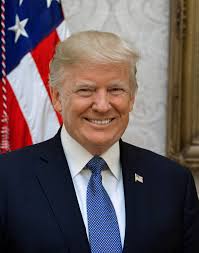Trump crypto firm quiet on Shehbaz talks, CEO of partner talks of Pakistan image makeover

A cryptocurrency venture with ties to former U.S. President Donald Trump has recently attracted global attention following its partnership with Pakistan’s newly formed Pakistan Crypto Council (PCC). While the Trump-linked firm has remained silent on the reported discussions with Pakistan’s Prime Minister Shehbaz Sharif, the CEO of its Pakistani partner has openly spoken about ambitious plans to reposition Pakistan’s global image through blockchain technology and digital finance.
This development comes amid growing scrutiny of the firm’s international dealings, raising questions about the intersection of business interests and diplomacy in geopolitics.
The Trump Crypto Connection and Pakistan Deal
World Liberty Financial Inc. (WLFI), a crypto firm reportedly majority-owned by Donald Trump and members of his family, signed a memorandum of understanding with the Pakistan Crypto Council in late April 2025. The deal aims to boost blockchain adoption, encourage the use of decentralized finance (DeFi), and support Pakistan’s vision for a modern digital economy.
WLFI was co-founded by Zach Witkoff, son of Steve Witkoff, who served as Trump’s envoy to the Middle East. The firm has garnered significant attention for its rapid growth and high-profile backing. The PCC, meanwhile, was established by the Pakistani government to oversee and promote cryptocurrency initiatives, signaling Pakistan’s interest in becoming a player in the global crypto ecosystem.
In a formal signing ceremony attended by Pakistani Finance Minister Muhammad Aurangzeb and PCC CEO Bilal Bin Saqib, the deal was positioned as a strategic move to leverage blockchain technologies for economic modernization.
Silence from Trump Crypto Firm on Shehbaz Sharif Discussions
Despite media reports suggesting that WLFI has engaged in conversations with Prime Minister Shehbaz Sharif, the company has maintained a low profile regarding these discussions. Representatives from WLFI have not commented on the nature or status of any talks with the Pakistani government, fueling speculation.
This silence stands in contrast to the vocal statements from Bilal Bin Saqib, CEO of the Pakistan Crypto Council, who has publicly articulated the broader vision behind the collaboration.
Pakistan Crypto Council CEO’s Vision: A Digital Renaissance
Bilal Bin Saqib has emerged as the prominent face of this partnership, sharing bold ambitions for Pakistan’s future in the blockchain space. In multiple interviews, Saqib has described Pakistan and Bitcoin as “victims of bad PR,” highlighting the need to change global perceptions of both.
He envisions establishing a “Strategic Bitcoin Reserve” for Pakistan — an initiative aimed at positioning the country as a pioneer in digital currency holdings. Saqib emphasized Pakistan’s untapped potential, suggesting that blockchain and cryptocurrencies can be powerful tools for economic revitalization and attracting foreign investment.
Beyond financial goals, Saqib has framed this partnership as an opportunity for a broader image makeover of Pakistan, striving to showcase the country as a progressive, tech-savvy nation eager to embrace innovation.
U.S. Senate Scrutiny and Conflict of Interest Concerns
The involvement of a Trump-associated crypto firm in Pakistan has not gone unnoticed by U.S. lawmakers. The Senate Permanent Subcommittee on Investigations, chaired by Senator Richard Blumenthal, has requested documents from WLFI relating to communications with Pakistani officials, including Prime Minister Shehbaz Sharif.
The inquiry seeks to clarify whether there are any conflicts of interest or violations of federal law, especially given the blending of private business endeavors with diplomatic connections. Critics argue that the Trump family’s financial interests in WLFI could potentially influence or be influenced by political dealings abroad.
Adding to the complexity, WLFI recently secured a $2 billion investment from a UAE-backed firm, underscoring the scale and international dimension of the venture. This influx of capital has intensified questions around transparency and accountability.
What This Means for Pakistan’s Digital Future
Pakistan has faced significant economic challenges in recent years, including foreign debt, inflation, and a need for economic diversification. In this context, the government’s engagement with blockchain technology and cryptocurrency is part of a broader strategy to attract investment, create new revenue streams, and modernize the financial sector.
The partnership with WLFI and the Pakistan Crypto Council may provide access to cutting-edge blockchain expertise and global networks. If successful, initiatives like the Strategic Bitcoin Reserve could set precedents for other emerging economies seeking to leverage crypto assets.
However, the success of these efforts will depend heavily on clear regulatory frameworks, public trust, and international cooperation. Pakistan’s government must balance innovation with the risks inherent in cryptocurrency markets, including volatility, regulatory uncertainties, and concerns about misuse.
Navigating the Thin Line Between Business and Diplomacy
The case of WLFI’s partnership with Pakistan highlights an increasingly common challenge in global affairs: the blurring of lines between private business interests and official diplomatic efforts.
When former political leaders or their families engage in commercial ventures overseas, especially in emerging sectors like cryptocurrency, it raises questions about ethics and influence. Transparency, proper oversight, and clear separation of business from government roles are critical to maintaining public trust.
While the Trump family’s involvement in WLFI may bring international attention and investment, it also risks complicating diplomatic relations and exposing all parties to scrutiny.
The Road Ahead
As investigations and inquiries continue in the United States, the WLFI-Pakistan partnership is at a crossroads. Pakistan stands to benefit from technological innovation and foreign investment, but must carefully manage the optics and implications of this high-profile collaboration.
The next few months will likely reveal more details about the talks with Prime Minister Shehbaz Sharif and the extent of involvement by WLFI. Meanwhile, the Pakistan Crypto Council, led by CEO Bilal Bin Saqib, will push forward with its agenda to reposition Pakistan as a digital finance hub.
For Pakistan, embracing blockchain and crypto represents both an opportunity and a challenge. Success will require prudent policymaking, international engagement, and transparency to ensure that the benefits of this new frontier reach the broader population.






